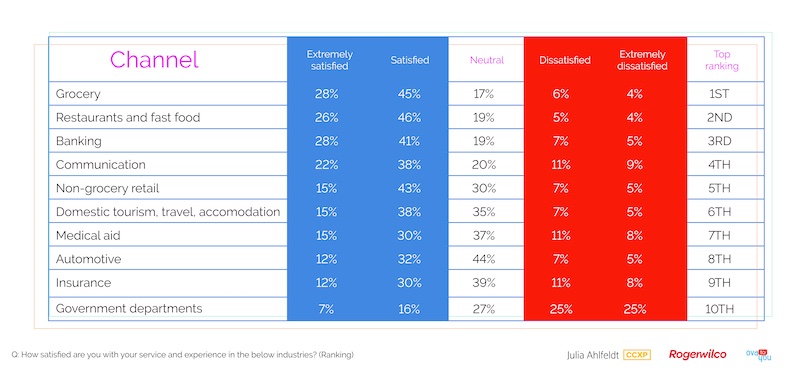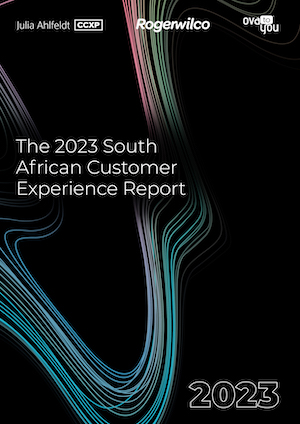Online engagement has grown significantly over the years as more consumers chose digital options to buy groceries, medication and clothing, among other items.
This was fast-tracked by the pandemic, of course, but now that the Covid-19 hangover is almost over, consumers’ behaviour has changed. We no longer have the same level of empathy for brands and instead have developed a striking state of apathy, disempowerment and disappointment for brands that fail to meet our expectations.
This is according to the fifth South African Customer Experience Report, which has just been released. Based on a sample of 2 000 online individuals and 50 business leaders, it was co-authored by Charlie Stewart, Rogerwilco CEO, Amanda Reekie, founder of research tool ovatoyou and Julia Ahlfeldt, founder of Julia Ahlfeldt Customer Experience Consulting.
Reasons for this shift in consumer sentiment could be related to the general malaise that we experience as South Africans every day. Very little works with load- and water-shedding becoming the new normal, and coupled with a cycle of high interest rates, inflation, fuel and food prices, few can disagree that the State is in a poor state.

The leaky bucket
This nation-wide apathy has created a consumer who is accepting that, among the brands they shop from, “’good enough is good enough’. “We have let our standards slide so far that we are willing to let brands get away with substandard service, quality and reliability,” says Stewart.
Of course, while consumers have lowered their expectations, there is a lot to be said for the state of mind of brands too. Likely to be feeling the economic pinch, many are chasing acquisition over retention, creating a ‘leaky bucket’ syndrome. Onboarding a new customer appears easier than keeping an existing one, leading to a cycle of seducing the new while losing the current.
“It is perplexing that brands continue to prioritise new business when there are relatively simple fixes to improve retention. If the profit opportunity is so large among existing customers, why then are businesses chasing new revenue over locking in customers for life?” posits Ahlfeldt. It seems that this is truly the case, with only 14% of business respondents citing retention as a more important focus for their organisation than acquisition.
Since acquisition trumps retention in terms of business focus, it is little wonder then that existing customers are receiving a poor customer experience. This could be a case of “the devil you know” but also because there are few alternatives.
“If we look at one of the most iconic South African brands that has built massive rapport with its customers it’s YuppieChef. Launched in 2006, its hand-written notes propelled it into consumer nirvana, and it still gets kudos for this simple way of creating the human touch. Seventeen years later, however, where is the next Yuppiechef?
“Where are those exceptional brands that delight us and put us – the customer – at the centre of their business? If Jeff Bezos can do it with Amazon, and create a global mega-brand, then why can’t our local brands follow suit?” Stewart asks.
Speaking up online
Stewart says that we need to hold more brands to account – and there is a very powerful way with which to do that: reviews and recommendations. Now among the most common actions performed online 67% of consumers either post reviews and recommendations or read those of others, which collectively could be as high as R40.2 billion for this year alone.
“Travellers for instance can view a property’s popularity on Booking.com before confirming their stay or refer to social media to get a sense of what others’ experiences were. This is empowering as it gives consumers the tools with which to call brands out if they are not living up to their promises,” says Reekie.
This trend applies to most sectors. From groceries and non-grocery retail, to restaurants and fast food, domestic travel, communication such as cellular and fibre connectivity and automotive, collectively these categories account for a significant R2-trillion in on- and offline sales, representing 43% of GDP.
By extrapolating consumers’ typical online activity during the purchase journey we found that online product research (reviews, recommendations, browsing) impacts R516-billion of purchase decisions within the total R2-trillion retail pie, highlighting the strength of actively driving positive reviews, something that 64% of our respondents said they did by posting on social media.
Conversely, if customers have a negative experience 59% said they tell their friends and family and are more likely to air their grievances in public with 50% confirming they’d post on social media or a review site. This is up from 43% in 2022. This trend must not be overlooked by brands as the more consumers trust reviews, the more impact these will have on securing or losing sales.
Acquiring data for data’s sake
Another critical area for businesses to consider is the acquisition of consumer data. It is estimated that companies collect somewhere in the region of 2.5 quintillion bytes of data every day – but simply are not capable of processing or utilising all that they capture.
Herein lies a huge disconnect: a meagre 14% of businesses surveyed said they always use their data, yet 69% of consumers strongly believe that the brands that they deal with are using their data to enhance their customer experience.
“There is a growing disconnect between what businesses do with the data and feedback they collect and what consumers think they do with it. The reality is businesses have access to an avalanche of data and customer feedback but few can use all of it.
“This creates a sense of false belief among consumers as they are giving their data away, often for free, but getting little in return. “It is evident that if companies don’t start acting on the feedback they’re given and use the data they have access to improve delivery, at some stage consumers will stop providing it,” says Reekie.
Resolutions need the human touch
Service and support services are another area of contention. Understandably companies want to cut costs and are increasingly using tech to improve systems, but it is clear from our research that consumers still want to talk to a human instead of a bot for first contact resolution but are happy to self-serve if they can.
It is little wonder then that email (24%) remains the most popular form of contact, alongside call centres (18%). Website chat is used by only 10% (versus 17% last year) while people’s willingness to consult FAQs is down to 4% from 8%. Interestingly, while just 8% would go into a store or branch to resolve an issue, it proved to be the most effective channel for first time resolution.
This may change thanks to the latest innovation sweeping the globe: large-language AI models (LLMs). However, there is a caveat: when businesses lean towards digitising engagement it can cause dehumanisation and a loss of empathy. Those who use LLMs must consider how to retain high touch with their customers amidst a high tech world.
Of course, among these new LLMs, the frontrunner is OpenAI’s ChatGPT. As South Africans we lag behind the international uptake of the tech as only 15% of our customer panel had tried it while just under half (49%) had never heard of it.
Nearly a third (31%) believed it would become a part of their lives in the near future. In contrast, in the US, 47% of consumers have used it, and globally, 68% of ChatGPT users consistently choose it over a search engine.
When we asked our local businesses their opinions, 46% of organisations are considering using ChatGPT, or other LLMs, to enhance CX and service delivery, but just 30% think it will be effective. Ahlfeldt cautions however that, “ChatGPT should not be underestimated as a game-changing tool in the hands of consumers and businesses alike.”
Change consumers’ complacency by delivering better CX
With all of this in mind, there is a clear difference in opinion, and experience, between consumers and brands. It may be the tough operating environment that we find ourselves in that is causing businesses to seek more revenue, at the cost of losing existing customers. But the opportunity to impact the bottom line is sitting right under businesses’ noses.
As our report shows, customers want to be treated as human beings, they want to have good experiences throughout the on- and offline purchasing journey and, if they are not happy, will tell others about it. While consumers were extremely forgiving of brands during the Covid-19 years, they no longer are and instead have become apathetic and complacent, accepting that good enough is good enough, instead of great.
This presents both a threat and an opportunity for brands. It’s a threat if they continue as is, offering poor experiences which could cause customers to leave, while it’s also a significant opportunity for the brand that disrupts their market by making relatively simple changes to how they engage their customers.
“Brands are sitting on a golden opportunity to up their game and offer great not just good CX. As we have seen, this influences customer loyalty, positive recommendations to others, re-purchasing / re-using products and turns everyday users into micro-influencers,” Reekie says.
“Together, this is proven to impact growth in sales and repeat business which is what every business, from the smallest to the largest, wants: how to move the financial needle. But are they listening?”
The report can be accessed by clicking on the cover.















